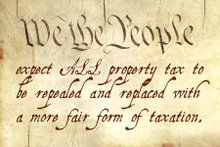Why should homeowners have to find room in our budgets for income or other tax increases? Why should we do with less so that our government can get larger and more bureaucratic and unfair?
Citizens, at least those who are not sucking on the government tit, want the government to find room in their budgets to cut excessive spending.
If our bond rating goes down because our income goes down, is that necessarily a bad thing? Maybe our creditors are trying to tell us that we don't have business borrowing more money because HELLO...we can't pay it back! Our state's debt to income ratio is out of whack. Raising taxes is not the answer unless we also get full out repeal of property tax.
Repeal of property tax will cause spending (and the state's sales tax income) to drastically increase. Remember Ronald Reagan and "Reaganomics"?
Kudos to Kenley for saying "property taxes are inherently unfair in that they do not reflect a person's ability to pay them and that some of the changes may force government to adjust to downturns in the economy just as homeowners are forced to do." Could it be that Senator Kenley has finally heard the people? The people want our government to CUT SPENDING!
The taxpayers are also wise now to the government's history of "bait and switch" with our money. We know you use our homes as collateral, we know you are only doing something now because there was public outrage, and we know you are all afraid for your jobs...as you should be. Most of you won't see another term in office.
-- HFFT
Senators move property tax bill forward - with changes
By Mary Beth Schneider
mary.beth.schneider@indystar.com
February 19, 2008
The Senate Tax and Fiscal Policy Committee voted unanimously today for a property tax plan that would cap homeowners' property taxes but push local government to raise income taxes.
The Senate committee made many changes to House Bill 1001, which earlier passed the House 93-1 and which contains Gov. Mitch Daniels' property tax package.
But the major components of the bill remain the same -- circuit-breakers that cap homeowners' bills at 1 percent of their home's assessed valuation; rental and agricultural property at 2 percent and business property at 3 percent; spending controls on local government which require voters to approve most major government building projects except for fast-growing school districts; and an increase of the state sales tax to 7 cents on the dollar up from the current 6 percent.
That sales tax increase allows for the state to pick up the cost of several programs currently paid for by local property taxes.Among changes the Senate committee made: The state would pick up not only the general funds of all public schools and child welfare costs, but also the cost of school debt service, juvenile incarceration, school pension debts and those police and fire pensions that are based on pre-1977 plans. Those pre-1977 plans total some $90 million statewide.
Another change would have county councils merely review and make recommendations on all budgets for local taxing units. Under the version passed by the House, county councils would have to approve all those budgets.
While Democrats on the committee voted for the measure, they also raised concerns that the proposal cuts funding for schools and also is more of a tax shift than a tax cut. Sen. John Broden, D-South Bend, said that in his city someone with a $60,000 home and a low to middle income would see their overall tax burden go up as both sales and local income taxes went up, while someone in a $600,000 home would see their taxes go down thanks to a hefty property tax cut.
The committee chairman, Sen. Luke Kenley, R-Noblesville, said it was important for the legislature to continue to debate those issues and to fully inspect the impact of the bill.
But Kenley noted that property taxes are inherently unfair in that they do not reflect a person's ability to pay them, and that some of the changes may force government to adjust to downturns in the economy just as homeowners are forced to do.
Kenley's analysis of the bill said that if counties implement a half-percent increase in their local option income taxes in addition to the other changes in HB 1001, that homeowners woujld see their bills shrink an average of 50.6 percent statewide by 2010 over what they otherwise would have been. Without the local income tax increase, homeowners' bills would shrink 35.7 percent on average statewide by 2010.
Tuesday, February 19, 2008
Senator Kenley: "Property taxes are inherently unfair"
Posted by
M Theory
at
Tuesday, February 19, 2008
![]()
Subscribe to:
Post Comments
(Atom)




No comments:
Post a Comment